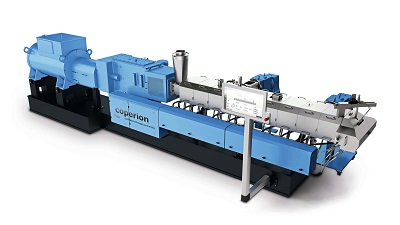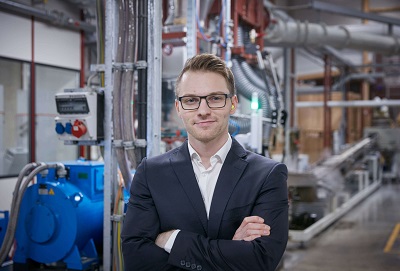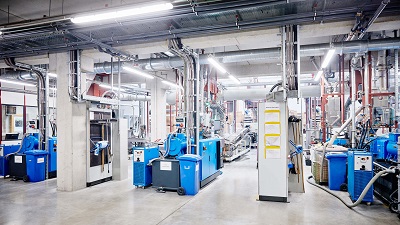Aurora Kunststoffe, a company located in Neuenstein / Germany and since end of 2019 member of the MOL Group, demonstrates how plastic processors’ production waste can be recycled and upcycled profitably. This producer of recompounds uses rejected parts accumulated from plastic components manufacturing as primary raw material and processes it into recycled, new-product-quality plastic compounds. After a major fire in their production area in 2017, Aurora Kunststoffe decided once again to rely on ZSK twin screw extruders from Coperion. Those three ZSK 45 Mc18 twin screw extruders have been in successful operation since early 2019, and with their high throughputs and their reliability, they have fulfilled every requirement that Aurora Kunststoffe needs for their innovative business plan.
Japan-based independent research and development company, DJK Corporation, has expanded its test lab with a ZSK 32 Mc18 twin screw extruder. DJK Corporation has been successfully established on the market as, among other things, a service provider for product testing as well as research and development projects for compounders.
Technology for first-rate compounds
In manufacturing technical plastic parts, typically there is approximately a 5% rejection rate. Aurora Kunststoffe purchases this production waste, then examines the precise composition and varietal purity. Once they pass quality control, the single-variety plastic parts are ground, fed into the compounding process and pelletised. The result is pellets mainly based on PA6, PA66, PA11, PA12, POM, PP, PC, and PC-ABS. To accomplish this, Aurora Kunststoff relies on Coperion ZSK technology. Within the ZSK twin screw extruders, the ground material is reliably homogenised with additives, fillers and reinforcing materials and devolatilized.

Aurora Kunststoffe has relied on ZSK twin screw extruders from Coperion
To this end, Coperion designed each of these three ZSK 45 extruders individually for Aurora Kunststoffe’s requirements, equipping them with ZS-EG twin screw side devolatilization units and special wear protection for product-contact parts. Following melt discharge from the die head at the end of the extruder’s process section, plastic strands are taken over by semiautomatic SCP 200 strand conveying systems from Coperion Pelletizing Technology. They are automatically conveyed via a cooling water chute and a conveyor belt to the strand pelletiser’s feed mechanism, where they are cut to compounds whose quality corresponds to that of new material. Noted Norbert Büter, Coperion Sales Manager, “When recycling plastics, it is necessary to adapt the process parameters and recipes to the various raw materials. With their flexibility and high torques, ZSK twin screw extruders are optimally suited for processing even the most difficult raw materials to very good product quality – and they do it at throughputs that are economical. By devolatilizing using ZS-EGs, not only are unwanted gases removed; operational safety of the entire vacuum system is increased. This applies especially to even very volatile viscosities.”
In 2017, a large fire at Aurora Kunststoffe destroyed the entire production area. Aurora Kunststoffe held fast to its successful sustainability concept, even expanding it after the fire. New twin screw extruders began operation in a new, larger space in 2019. In meeting such a tight deadline, Aurora Kunststoffe relied on close collaboration with their suppliers. Alexander Schweinle, Head of Production at Aurora Kunststoffe, is particularly proud of this: “Coperion delivered not just three ZSK 45 extruders that were individually designed for us, and the appropriate strand pelletizers, but they also supported us with the engineering necessary for the entire production. I would like to emphasize the really good collaboration between our two companies: Coperion consistently reacts to our inquiries quickly and knowledgeably, which was key during our production’s rebuilding phase.”
Successful recycling concept
Production waste from industrial plastics manufacturing is becoming more and more valuable in times of rising raw materials prices and increased environmental pollution. Aurora Kunststoffe buys these industrial by-products and turns them into high-quality raw materials that are used in the automotive, construction, furniture and electronics industries.
Plastic waste comes to Aurora as part of its unique Aurora-Lean-Logistics concept, consisting of Aurora’s own fleet of about 60 semi-trailers and a box concept for perfecting single-origin collection. At Aurora, materials are ground and processed into recompounds by means of extrusion. With this process, Aurora Kunststoffe achieves throughputs of up to 650 kg/h on their ZSK 45 twin screw extruders. Per day, Aurora Kunststoffe produces over 50 tonnes of compounds. For the future, Aurora anticipates increasing demand. “I am certain that sooner or later, there will be a legally mandated recycling quota”, said Schweinle.

Mr. Alexander Schweinle, Head of Production at Aurora Kunststoffe
Jochen Schofer, Business Segment Manager, Recycling & Direct Extrusion at Coperion added: “We’re convinced that becoming circular is unavoidable for the plastics industry.” To that end, there is still plenty of room for improvement. In Germany, the share of recyclate used in plastics processing in 2017 only achieved a bit more than 12%. Aurora Kunststoffe, in contrast, is taking an absolutely leading role for us; their company concept is not only profitable, it’s sustainable too! We’re proud to support Aurora Kunststoffe with our compounding and engineering know-how!”
Test lab expansion supported
Independent research and development company DJK Corporation, based in Chiba, Japan, has expanded its test lab with a ZSK 32 Mc18 twin screw extruder from Coperion. Representatives from Coperion and DJK met at Coperion’s booth at K 2019 in October to officially sign the contract.
For over 50 years, DJK Corporation has been successfully established on the market as, among other things, a service provider for product testing as well as research and development projects for compounders. The company’s own test lab is expanded with the addition of a ZSK 32 Mc18 extruder with a 32 mm screw diameter. Coperion configured this twin screw extruder to provide DJK with maximum flexibility in laboratory operation. DJK can set up the process section in an optimised manner for a wide variety of product applications. The ZSK 32 Mc18 can be equipped with ZS-B side feeders, with the Feed Enhancement Technology FET, which optimises the material intake capacity, as well as with a ZS-EG side devolatilization unit.
Peter von Hoffmann, General Manager of the Engineering Plastics, and Special Applications Business Unit at Coperion, said: “We’re very happy to be able to equip such a renowned company as DJK Corporation with one of our ZSK twin screw extruders. We are convinced that the ZSK 32 extruder, with its enormous configuration flexibility, high reliability, and safe, secure scale-up to larger extruder sizes, is the optimal technology for a large bandwidth of compounding tests. Moreover, we are very pleased to announce that, moving forward, Coperion customers in Japan have a testing area at their disposal as well, using the DJK test lab. This is an outstanding outcome of really good cooperation between DJK and Corporation and Coperion.”

ZSK extruder for closed-loop multi-layer production
Visionary multi-layer film recycling
Beyond providing its customers with the most appropriate extruders to meet their requirements, Coperion GmbH is implementing a closed-loop concept for the production of flexible multi-layer film. Recycling multi-layer film has long posed a challenge since such films can only be reclaimed in very complicated ways and not without residues. Now, however, Coperion has developed a closed-loop approach solution in which up to 100% of multi-layer film production waste can be re-processed and fed back into the production process in a closed-loop. For a concrete project Coperion delivers a recycling system, including bulk material handling, high-accuracy feeding from Coperion K-Tron, and the heart of the system, a ZSK Mc18 twin screw extruder.
Multi-layer film waste resulting during the production process is shredded as a first step before it is fed into the ZSK extruder via pneumatic conveying and highly accurate feeding from Coperion K-Tron. There, the material is homogenized and devolatilized with very high intensity in the co-rotating ZSK Mc18 twin screw extruder. Within the extruder, dispersion and devolatilization performance are crucial to end product quality — with gentle product handling and very good mixing behavior even at very high throughput rates, thus achieving consistently high product quality.
Following homogenisation in the ZSK extruder, in the closed-loop concept, the recycled material is added back into the multi-layer film production process; with no quality loss and the proportion of added recyclate is very high. Multi-layer film manufacturing thus takes place sustainably, highly efficiently, and resource-friendly with the aid of advanced technologies.
For more information on Coperion in Asia, visit: http://image.industrysourcing.com/drupal_ringier/supplier/coperion-keya-machinerycoltd-0














